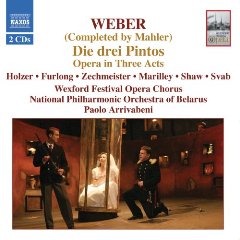Weber – The Three Pintos (Arrivabeni) [2003]
Weber – The Three Pintos (Arrivabeni) [2003]

DISC 1 Die drei Pintos, J. Anh. 5 (completed G. Mahler) 1 Act I: Ensemble - Leeret die Becher, mutige Zecher! 00:06:44 2 Act I: Rondo a la Polacca - Was ich dann tu', das frag' ich mich 00:03:22 3 Act I: Terzettino - Ei, wer hatte das gedacht! 00:01:11 4 Act I: Romanze vom verliebten Kater Mansor - Leise weht' es, leise wallet 00:03:44 5 Act I: Seguidilla a dos - Wir, die den Musen dienen 00:05:24 6 Act I: Terzett - Also frisch das Werk begonnen! 00:07:25 7 Act I: Finale - Auf das Wohlergeh'n der Gaste! 00:11:11 DISC 2 1 Entr'acte 00:06:40 2 Act II: Introduction und Ensemble - Wisst ihr nicht, was wir hier sollen? 00:11:59 3 Act II: Ariette - Hochste Lust ist treues Lieben 00:03:41 4 Act II: Arie - Ach, wenn das du doch vermochtest! 00:08:19 5 Act II: Duett - Ja, das Wort, ich will es sprechen 00:05:13 6 Act II: Terzett-Finale - Geschwind nur von hinnen! 00:03:27 7 Act III: Lied mit Chor - Schmucket die Halle mit Bluten und Zweigen 00:02:35 8 Act III: Duett - Nun, da sind wir 00:03:01 9 Act III: Terzettino - Madchen, ich leide heisse Liebespein! 00:01:51 10 Act III: Ariette - Ein Madchen verloren, was macht man sich d'raus? 00:04:23 11 Act III: Rondo-Terzett - Ihr, der so edel 00:06:00 12 Act III: Habt ihr es denn schon vernommen? 00:02:34 13 Act III: Mit lieblichen Blumen, mit duftenden Bluten 00:01:57 14 Act III: Finale A - Was wollt Ihr? 00:10:32 15 Act III: Finale B - Heil sei Euch, Don Pantaleone! 00:02:55 Robert Holzer, baryton-basse Lubomir Matl, choirmaster Peter Furlong, ténor Barbara Zechmeister, soprano Sophie Marilley, mezzo-soprano Eric Shaw, ténor Alessandro Svab, basse Stewart Kempster, basse Sinead Campbell, soprano Ales Jenis, baryton Belarussian National Philharmonic Orchestra Paolo Arrivabeni – conductor Live recording of the 2003 Wexford Festival Opera
The Wexford Festival was founded in 1951. It aims to present three rarely performed operas each year. The performances are spread over eighteen days and draw audiences from all over the world. Notable names such as Mirella Freni and Ugo Benelli appeared at Wexford in their early careers, gaining much valuable experience and exposure.
On completion of his opera Der Freischütz in the summer of 1820 Weber decided on a comic opera, Die drei Pintos, to a libretto written by Theodor Hell. He worked on the score during 1821 but complications over dedicating it to the King caused him to put the work aside. He never completed it. His plan was for the opera to consist of an overture and sixteen numbers. When Weber stopped work there were only sketches for seven items. Weber’s widow passed the sketches to Meyerbeer for him to complete the work. He did nothing with them for twenty years before declaring the task to be impossible. In 1886 the young Gustav Mahler, then aged 26 and with none of his compositions published, undertook the task. He found that the sketches needed not only orchestration but to be figured and harmonized as well. Mahler filled out extra material from Weber’s other music. In an erudite sleeve-note, Michael Kennedy gives the final scenario with indications of which ‘extra’ numbers were chosen.
The implausible plot concerns the substitution, twice, of Don Pinto on his way to Seville to marry Clarissa who is in love with Gomez. Needless to say the second substitution makes Gomez the third Pinto and he marries Clarissa. Eventually the real Pinto turns up and Clarissa’s father is furious, but all ends happily. A happy outcome cannot be posed for this recording. The best live recordings come about when audiences stifle their coughs and limit their applause to the ends of scenes or acts. With recordings of live opera performances there are the further complications of off-microphone singing and the noise of stage movement, the latter being beyond the control of the recording engineer. In a comic opera there is likely to be much coming and going and audience laughter if the performance is going well. It does go well here, but I have to admit to finding so much extraneous noise seriously limiting enjoyment and appreciation. Consequently I cannot seriously recommend this recording to those interested in Weber’s intentions or Mahler’s realisation. I do realise that when such recordings are envisaged, the recording company does not know how the production will pan out and they take a gamble. Those interested in the opera should pursue the early 1970s RCA recording with Lucia Popp, Werner Hollweg and Hermann Prey. The only people likely to enjoy this recording are those who were present at the Wexford performances and who want a memento of the occasion. ---Robert J Farr, musicweb-international.com
download (mp3 @320 kbs):
uploaded yandex 4shared mega mediafire solidfiles zalivalka cloudmailru oboom
